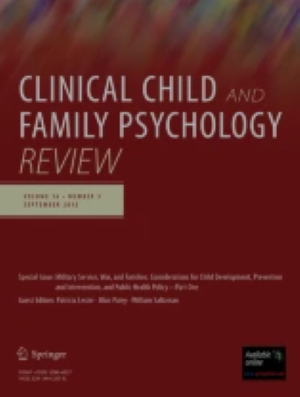社区暴力暴露中父母与青少年差异的系统回顾。
IF 6.1
1区 心理学
Q1 PSYCHOLOGY, CLINICAL
引用次数: 0
摘要
过去的研究一致发现,不同的信息提供者对青少年经历的评分存在分歧。例如,父母和青少年报告的青少年遭受社区暴力(ECV)的流行程度和频率评级不同,过去的研究表明,与青少年相比,父母通常少报青少年的ECV。然而,最近的研究与先进的统计分析揭示了更微妙的报告模式,一些父母夸大了他们的孩子的ECV,一些少报,和其他父母-青年双同意年轻人或有或没有经历过ECV。这些报告模式是理论化的,为亲子关系和家庭功能提供了有价值的见解,并对青少年的情感和行为发展有启示。本系统综述综合了14项关于青少年ECV中父母-青少年差异的现有研究(N = 12,824对父母-青少年对),以阐明信息差异的模式及其与父母-青少年关系质量、家庭功能和青少年结局的相关性。使用先进分析方法(k = 2)的研究,如潜类分析和多项式回归,确定了父母-青少年报告的多种模式(例如,父母-青少年对青少年ECV的低水平或高水平的一致,父母少报,父母与青少年相比多报)。不良的亲子关系和家庭功能(例如,较低的父母温暖,较高的父母敌意)与青少年ECV中较高的亲子差异相关。青少年ECV和青少年功能的信息差异模式有不同的发现。最后,对青少年ECV中亲子差异的研究方向提出了建议。本文章由计算机程序翻译,如有差异,请以英文原文为准。
Systematic Review of Parent-Youth Discrepancies in Exposures to Community Violence.
Past studies have consistently found that different informants disagree on ratings of youth's experiences. For instance, parents and youth report different prevalence and frequency ratings of youth's exposure to community violence (ECV), with past studies demonstrating that parents typically underreport youth's ECV compared to the youth. However, recent studies with advanced statistical analyses revealed more nuanced patterns of reports, with some parents overreporting their youth's ECV, some underreporting it, and other parent-youth dyads agreeing that the youth either did or did not experience ECV. These report patterns are theorized to provide valuable insight into parent-child relationships and family functioning and have implications for youth emotional and behavioral development. The current systematic review synthesized 14 existing studies (N = 12,824 parent-youth dyads) on parent-youth discrepancies in youth ECV to elucidate patterns of informant discrepancies and their correlates to parent-youth relationship quality, family functioning, and youth outcomes. Studies that used advanced analytic approaches (k = 2), such as latent class analysis and polynomial regression, identified multiple patterns of parent-youth reports (e.g., parent-youth agreement on either low or high levels of youth ECV, parental underreporting, parental overreporting compared to youth). Poor parent-youth relationship and family functioning (e.g., lower parental warmth, higher parental hostility) were associated with higher parent-youth discrepancies in youth ECV. There were mixed findings with patterns of informant discrepancies in youth ECV and youth functioning. Suggestions for future directions for research on parent-youth discrepancies in youth ECV were made.
求助全文
通过发布文献求助,成功后即可免费获取论文全文。
去求助
来源期刊

Clinical Child and Family Psychology Review
PSYCHOLOGY, CLINICAL-
CiteScore
10.50
自引率
4.30%
发文量
45
期刊介绍:
Editors-in-Chief: Dr. Ronald J. Prinz, University of South Carolina and Dr. Thomas H. Ollendick, Virginia Polytechnic Institute Clinical Child and Family Psychology Review is a quarterly, peer-reviewed journal that provides an international, interdisciplinary forum in which important and new developments in this field are identified and in-depth reviews on current thought and practices are published. The Journal publishes original research reviews, conceptual and theoretical papers, and related work in the broad area of the behavioral sciences that pertains to infants, children, adolescents, and families. Contributions originate from a wide array of disciplines including, but not limited to, psychology (e.g., clinical, community, developmental, family, school), medicine (e.g., family practice, pediatrics, psychiatry), public health, social work, and education. Topical content includes science and application and covers facets of etiology, assessment, description, treatment and intervention, prevention, methodology, and public policy. Submissions are by invitation only and undergo peer review. The Editors, in consultation with the Editorial Board, invite highly qualified experts to contribute original papers on topics of timely interest and significance.
 求助内容:
求助内容: 应助结果提醒方式:
应助结果提醒方式:


